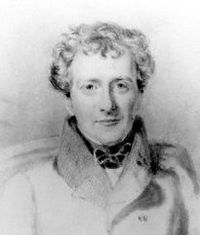Annotation:Oh No! We Never Mention Her (1)
X: 1 T:Oh no we never mention her. CJF.048 R:Air S:C.J.Fox MS, 1829/33, Beverley,E.Yorks. B:Kidson Coll.Mitchell Lib.M1805 O:England A:East Yorkshire Z:vmp.P J Headford 2000 & 2008 M:2/4 L:1/16 Q:1/4=60 K:G D2|G3F G2A2|B3B d2B2|A3^G A2c>B|G4z2D2| G3F G2A2|B3B d2B2|A3^G "~"A2c>B|G4z2||! d2|d3F F2A2|A3G G3E|DG3 "~"G3A/B/|A4z2D2| G3F G3A|B3B d2B2|" ad lib:"A2-A/c/f/e/ d3F|G4|]
OH NO! WE NEVER MENTION HER. English, Air. C Major. Standard tuning (fiddle). AABB. "Oh No! We never mention her" was a sentimental song by Thomas Haynes Bayly (1797-1839), an English poet and playwright who also penned "Long Long Ago." Bayly initially studied for the law, following his father, then tried for the clergy before finding a livelihood in writing. Although he wrote for the theater and for newspapers, he is remembered today for his sentimental songs (he wrote both lyrics and melody). The title of the present piece is taken from the lines:

Oh no! we never mention her,
Her name is never heard;
My lips are now forbid to speak
That once familiar word. Oh no! we never mention her.
From sport to sport they hurry me,
To banish my regret;
And when they win a smile from me,
They think that I'll forget.
Bayly's song was frequently published in 19th century collections, after its first publication around 1830, although it had been publicly sung earlier. As with many popular songs, it was quickly adapted. In fact, Bayly originally wrote it referencing a male character, "We never mention him," quickly converted to the other sex; it was also sung as a duet, switching pronouns back and forth.
The song was a parodist's delight and spawned numerous sets of lyrics. As evidenced by some American printed sheet music covers, it was also adapted and performed on the minstrel stage. The name of Charles Dickens character 'Mrs. Onowenever' in The Uncommercial Traveller (1860-61) was inspired by Bayly's song.
"Oh no, we never mention her" was entered in the mid-19th century music manuscript of William Winter (1774-1861), a shoemaker and violin player who lived in West Bagborough in Somerset, southwest England.

